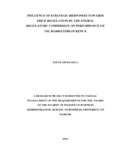| dc.description.abstract | This project examines the influence of strategic responses towards price regulation by
the energy regulatory commission on the performance of oil marketers in Kenya. The
study used a descriptive survey design which is a research technique where data is
gathered through asking various questions from the respondents. The population of
the study was from the sixty four oil marketing companies in Kenya (OMC’s). The
sample size for this study was thirty two oil marketing companies. The thirty two
OMC’s were selected using systematic random sampling method due to their
simplicity and good representation of the population. Primary data was collected by
use of a semi structured questionnaire. Primary data was collected from the marketing
managers or their equivalents which were considered appropriate since they
understood the strategic responses adopted by their respective oil marketers in Kenya.
The questionnaires were administered by drop and pick later method at an agreed time
with the researcher. The data was then analyzed using descriptive statistics in the form
of percentages, mean and standard deviation to determine the frequency of strategic
responses adopted by oil marketers in Kenya. It was revealed that the most popular
strategic responses adopted by most oil marketers were cost focus, diversification
both of which used to a large extent while cost leadership and product diversification
were used to a moderate extent. Further, the analysis revealed that the least used
strategies responses adopted by oil marketers were mergers and acquisitions, strategic
alliances, downsizing and logistics outsourcing which were used to a small extent.
From the analysis, a large majority of the respondents indicated that cost focus was
widely used by the OMC’s to a large extent. The OMC’s who used cost focus
commanded a combined market share of eighty percent. Further, all the leading
OMC’s in market share use cost focus strategy. A correlation analysis showed that
there existed a strong positive correlation between strategic responses and ROACE
and thus the strategic responses used by OMC’s influenced ROACE to a large extent.
A majority of the marketing companies that used cost focus and diversification
reported an average ROACE of six percent. The study recommends that Oil marketers
should pursue only those strategies that they can comfortably or successfully be
implemented with the least possible restrictions from the government and other
regulatory bodies for example the energy regulatory commission (ERC). The
limitation of this study was that the respondents were not willing to commit their time
to respond to the questionnaires. Most of the respondents agreed to participate on
condition that the information will not be divulged to any other party other than for
academic purposes only. From the findings, it was reviewed that majority of the
OMC’s used product differentiation as a response strategy. The oil products sold in
Kenya are jointly imported from the same source and distributed using common
facilities. With this common user importation and distribution facilities, it is expected
that product differentiation will be least applicable by the OMC’s. Due to this
controversy, future researchers can conduct further research to investigate the
applicability of differentiation as a response strategy. | en_US |

